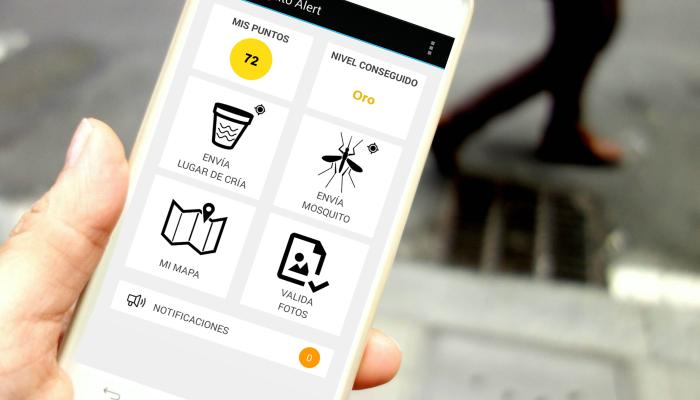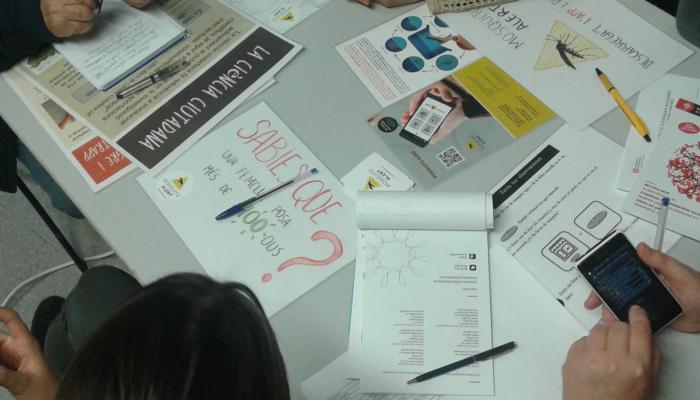
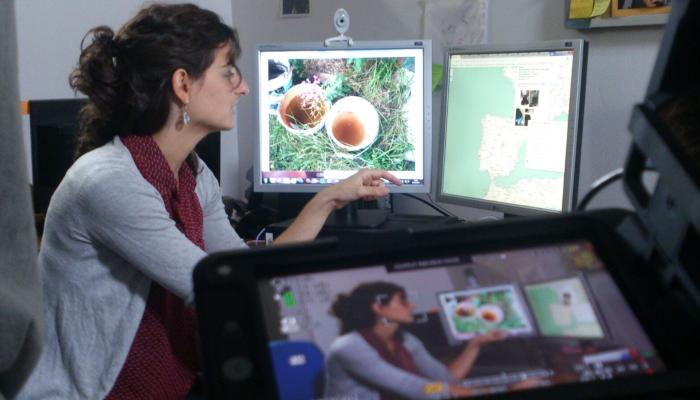
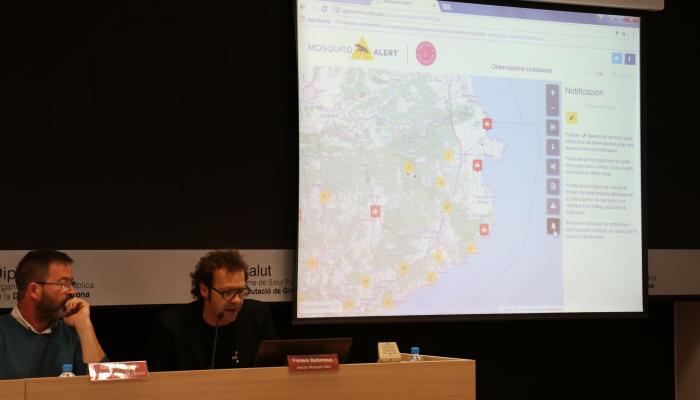
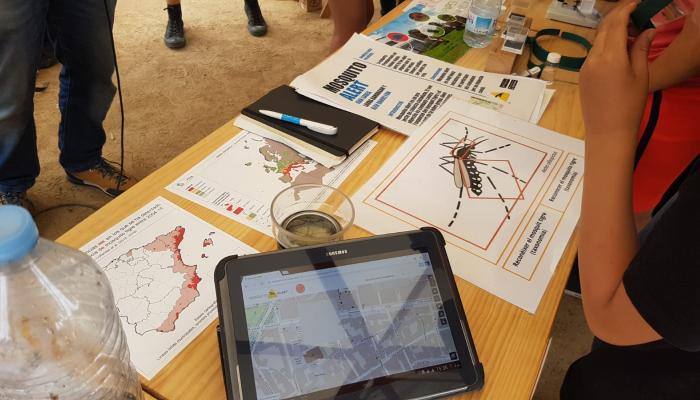
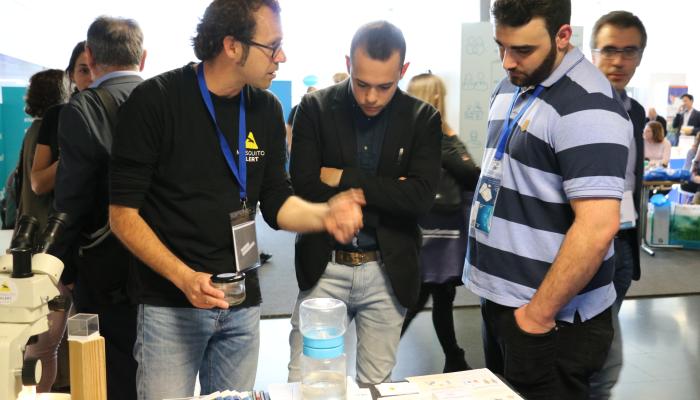
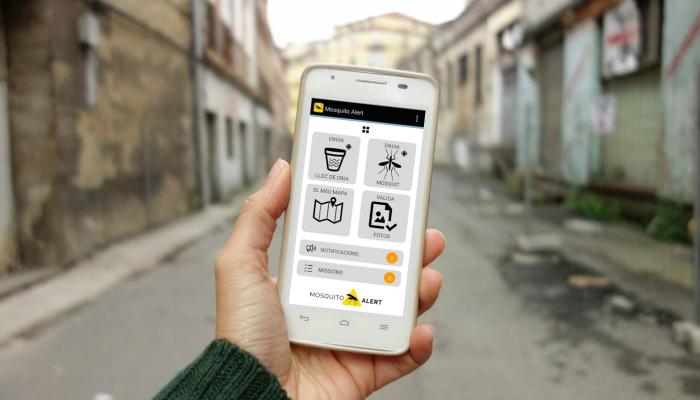
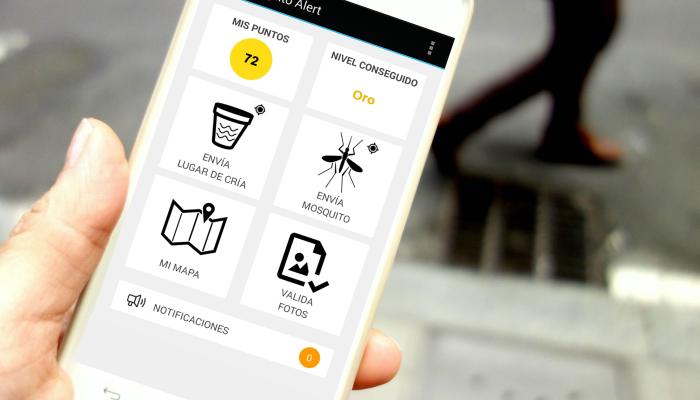
Mosquito Alert is a cooperative, non-profit citizen science project coordinated by different Public Research Centers, focusing on the development of predictive models and methods that combine citizen data (big data) with data from authoritative sources (Public monitoring or control Entities, Universities, ...). These models thus become key public health management tools for assessing and controlling the presence of species of mosquitoes that carry arboviruses (arthropod-borne viruses), causing global diseases such as zika, dengue and chikungunya, that require dynamic global solutions.
It is an open cooperative platform for the prevention, monitoring and control of possible invasive species of mosquitoes, constituting an effective and low-cost early warning system, which is integrated into our health and research system through the voluntary participation of citizens.
The reports of the World Health Organization (WHO) and the European Center for Disease Prevention and Control (ECDC) have warned of the influence of climate change on vector-borne diseases, such as ticks, mosquitoes, or sandflies. The ECDC has also indicated that changes in climate and the environment may influence the risk posed by vector-borne diseases (Bezirtzoglou et al. 2011).
By deducing the influence that climate has on vectors and knowing these predicted trends, it is thought that climate change could influence the frequency and global distribution of vector-borne diseases. In fact, in recent years there has been an increase in indigenous cases and epidemic outbreaks of certain vector-borne diseases in Europe (Githeko et al. 2000).
Given these circumstances, the Mosquito Alert platform emerged a few years ago as a tool for monitoring and controlling arbovirus-carrying mosquito species, where citizens are involved in a research project to fight these disease-transmitting mosquitoes, in light of its impact on public, social and educational policy.
Citizens’ observations form part of a common database useful for the investigation, monitoring and control of the tiger mosquito (Aedes albopictus) and the yellow fever mosquito (Aedes aegypti). This way, we analyze how citizen data can help to improve predictions about the presence and spread of these two mosquitoes.
Mosquito Alert is currently working to expand the project and offer a global tool. The app is translated into Chinese and the project has been replicated in Hong Kong. It also collaborates with partners in Latin America, the United States and the Netherlands, with the intention to open up to a full European framework.
The software used in the Mosquito Alert application is free and open source. It is distributed under a license that allows users to use, change, improve the software and redistribute it, either in its modified form or in its original form. Participation is in any case anonymous.
The ultimate goal of Mosquito Alert is to make real-time risk predictions of transmission of the viral diseases transmitted by the tiger mosquito and the yellow fever mosquito. Based on data obtained via mobile phones, the tool seeks to anticipate the associated risk of disease transmission to minimize health risks.
In this sense, Mosquito Alert has the scientific objective of generating high-level quantitative research and modeling to:
- Understand population dynamics and dispersal rates of disease-transmitting mosquito invasions
- Design effective strategies for the control and eradication of mosquito populations
- Make risk predictions with environmental, social and biological parameters
As a social objective, Mosquito Alert is a participatory alert system for citizen science and collaboration in the management of these mosquito species, minimizing the risk of disease transmission.
Through the app that has been developed for this purpose, anyone can report a possible identification of a tiger mosquito, yellow fever mosquito or other possible invasive mosquitoes and their breeding places on public roads by sending a photograph. The photograph captures the GPS position along with other detailed information. Afterwards, a human team of expert entomologists validates the photos received. The result of the validation is sent directly to the participant and is published on a map of observations, the data of which can be consulted since 2014.
This information complements the scientific work of the Research Centers involved in the control of mosquito pests, also allowing Public Health Managers to use this information to track and control their expansion in neighborhoods and cities. Finally, participants themselves learn about the recommendations to control the presence of these species in their homes.
Mosquito Alert is an open science platform that engages citizens in a project that has an impact on public, social and educational policy in the fight against disease-transmitting mosquitoes. In this sense, science and citizens have been working together for a long time to identify invasive species in Europe and currently on universal platforms such as "Global Mosquito Alert".
This innovative way of doing science offers new challenges and opportunities, both in terms of improving environmental management and public health management of disease-transmitting mosquitoes, since traditional monitoring and control methods are affected by budget constraints as demand grows and the scale at which to act, as climate change conditions expand their distribution and proliferation.
It is, in any case, an open system and one that is under continuous review and improvement, destined to resolve issues and progress epidemiological models and predictions with increasingly broad and complex citizen science methodologies, in a way that contributes to developing risk maps and online outbreak forecasting, both regionally, in Europe and even globally.
The platform undergoes continuous review and improvement, implementing new measures and solutions that contribute to improving the application and the results obtained. This is achieved through:
• website and mobile app optimization
• publication of an interactive public map of observations that allows consulting and downloading all the observations received and validated since 2014
• development of a probabilistic model for the presence of tiger mosquitoes in the areas of Spain, which is updated weekly and generates monthly estimates for a given area
• Visualization of data through interactive graphics in real time, which allows to view participation in different areas and analyze the quality of the data
• Citizen identification of tiger mosquitoes and yellow fever quickly and effectively, allowing their validation by at least 5 participants, with assignment of a reliability percentage organized by municipalities.
• expert validation by a team of expert entomologists from collaborating institutions, which allows the possible confirmation of the affected mosquitoes by conducting reviews using 3 independent validators and 3 levels of security (rejected, possible or confirmed). The final result is published on the map and sent to the participant through a notification within the app, occasionally including notes or comments of interest.
Each year, 500 million cases of mosquito-borne diseases, from malaria and dengue, to Zika or Chikungunya, occur worldwide. This number could increase due to global warming and rising temperatures, which is causing these insects to spread to new areas of the planet.
Given this situation, a system and/or platform such as Mosquito Alert enables:
- citizen involvement and participation in locating and monitoring these vector mosquitoes
- the preparation of predictive and preventive models against the distribution of these vector mosquitoes
- the implementation of information systems for early warning and location of possible population centers
- reduction of the epidemiological risk of transmitting the diseases carried by these vector mosquitoes
- the development of studies and control measures of great geographical and social importance
- the provision of data and resources to universal systems for the generation and treatment of global big data
The Mosquito Alert platform is coordinated by three public institutions in the field of scientific research:
- CREAF (Center for Ecological Research and Forest Applications)
- ICREA (Catalan Institution for Research and Advanced Studies)
- CEAB-CSIC (Center for Advanced Studies in Blanes)
And, it has the support and financing from three other institutions, both private and public:
- Obra Social “La Caixa”
- Dipsalut (Public Health Agency of the Diputació de Girona)
- FECYT (Spanish Foundation for Science and Technology)
Mosquito Alert is also sponsored by Laboratorios Lokímica SA.
However, and given the participatory and open nature of the platform, numerous monitoring and control entities, groups and associations collaborate with Mosquito Alert, highlighting the following:
- Monitoring and control agencies
- Barcelona Public Health Service (ASPB)
- Forest Management Service of the General Directorate of the Natural Environment and Biodiversity of the Department of Agriculture, Livestock, Fisheries, Food and the Natural Environment
- Center for Coordination of Health Alerts and Emergencies (CCAES) of the Ministry of Health
- Mosquito Control Service of the Badia de Roses i i del Baix Ter
- Mosquito Control Service of Baix Llobregat
- University Institute of Tropical Diseases and Public Health of the Canary Islands (University of La Laguna), of the Government of the Canary Islands
- Department of Zoology and Physical Anthropology of the University of Murcia
- Department of Animal Pathology of the University of Zaragoza
- Citizen participation organizations
- Crowdcrafting.org
- Fundación Ibercivis
- Associació Medioambiental Xatrac
Using a simple mobile application for citizen participation and science, the population can alert of the presence of these insects from anywhere in Spain. In this way, it will be possible to know exactly which places have been colonized, which will allow public administrations to take the necessary measures to try to control their expansion.
To name some fundamental successes of Mosquito Alert, in addition to those already described, the following should be highlighted:
- increase in the reliability of data submitted by citizens. Currently 36% of all validated observations were "confirmed" tiger mosquito sightings, with the "confirmed" observations outnumbering "possible" ones”
- Open access to available observations, by publishing the data through the GBIF global portal which currently stores more than 1,000,106 biodiversity data from around the world, of which 30,605 are data associated with the tiger mosquito (Aedes albopcitus). Of these data, 13% are citizen science data provided through Mosquito Alert, with nearly 4,030 observations of the tiger mosquito in Spain along with their corresponding images and geolocation.
- first report of the Aedes japonicus mosquito in the Iberian Peninsula and in southern Europe thanks to citizen science, spotted in Asturias by a network participant and validated by Mosquito Alert entomologists together with members of the University of Zaragoza responsible for the entomological surveillance project of the Ministry of Health, Consumer Affairs and Social Welfare
- first report of the Aedes vittatus mosquito in Galicia in September 2017, after receiving a photo from a volunteer who thought it was a tiger mosquito. In March 2018, after receiving the specimen, the Mosquito Alert validation team confirmed that it was Aedes vittatus, an indigenous mosquito that exists in various areas of Spain, but so far not documented in Galicia.
- numerous scientific articles, citations and presentations, conferences and knowledge transfers published and/or exhibited
- numerous awards and recognitions, including:
- 1st Ex Aequo Award for Interactive and Non-Interactive Science Teaching Materials - Science in Action Award XIX. October 2018
- Distinction to the Mosquito Alert Directorate from the Higher Council for Scientific Research, for its scientific merits. June 2018
- City of Barcelona Award 2017 - Earth and Environmental Sciences. February 2018
Particularly important is the participation of Mosquito Alert in other shared platforms such as:
- Global Mosquito Alert, sponsored by the United Nations and coordinated by the Center for Ecological Research and Forest Applications (CREAF) and the Center d'Estudis Avançats de Blanes (CEAB-CSIC)
- PICAT, a Comprehensive Platform for Arbovirus Control in Catalonia, which integrates epidemiological information in view of integrating all the relevant information regarding the onset of indigenous cases and create an intervention network with the main agents involved (primary care, specialized centers, research centers, public health agencies and civil society)
As for limiting factors, the very open, voluntary and participatory nature that defines citizen science stands out (referring to different ethical, legal, economic, intellectual property, data protection aspects, ...) and the associated technical complexity of managing global big data series.
The project is financed through contributions from public and private entities, obtained through open and competitive calls and research grants, such as the Fundación Bancaria La Caixa, the European Research Council, the Horizon2020 Program, the Netherlands Organization for Scientific Research (NWO) and the Spanish Foundation for Science and Technology (FECYT).
Mosquito Alert is based on an innovation and open science model, and protects the anonymization of citizens to the maximum level, without collecting any personal data at the moment. The intention is to incorporate this model into the Public Administration to manage any possible arboviruses.
At the national level, there is a National Plan for the Preparation and Response to Vector-borne Diseases, including mosquitoes of the Aedes genus that can transmit dengue, chikungunya, zika and yellow fever. In addition, regional plans and protocols exist for the surveillance and control of arboviruses transmitted by mosquitoes.
The Mosquito Alert project started in 2013 in Catalonia under the name ‘Atrapa el Tigre’ and with the objective of drawing a map of the tiger mosquito population distribution throughout the Peninsula, in order to study and control the expansion of this insect and its potential arrival to our country and causing yellow fever. It began with a pilot test in the province of Girona in 2013, with subsequent expansion to the rest of the country starting in 2014.
As of November 2016, the Mosquito Alert data and citizens’ observations map are accessible on the international portal of the United Nations Environmental Program (UNEP), which considers Mosquito Alert as a reference project.
In 2017, the shared platform "Global Mosquito Alert" was launched, with the support of the United Nations, with the aim to deal with this problem at a global level. It is a project that is firmly committed to uniting the efforts of the international scientific community, institutions and citizens to more effectively combat this threat to public health, derived to a large extent from two new scenarios such as climate change and globalization.
- Andradas Aragonés E. (Coord). 2015. Plan Nacional de Preparación y Respuesta Frente a Enfermedades Transmitidas por Vectores. Parte I: Dengue, Chikungunya y Zika. Ministerio de Sanidad, Servicios Sociales e Igualdad. 77 pp.
- Bartumeus F.; Costa G.B.; Eritja R.; Kelly A.H.; Finda M.; Lezaun J. et al. 2018. Citizen Science: A Gateway for Innovation in Disease-Carrying Mosquito Management?. Trends in Parasitology, 34(9): 727-729.
- Bartumeus F. et al. 2019. Sustainable innovation in vector control requires strong partnerships with communities. PLoS Neglected Tropical Diseases, 13(4): e0007204.
- Bezirtzoglou C.; Dekas K.; Charvalos E. 2011. Climate changes, environment and infection: facts, scenarios and growing awareness from the public health community within Europe. Anaerobe, 17(6): 337-340. En: “Impactos del Cambio Climático en la Salud”. Dirección General de Salud Pública, Calidad e Innovación. Informes, estudios e investigación. Ministerio de Sanidad, Servicios Sociales e Igualdad (ed.). 2013. 236 pp.
- Eritja R.; Palmer J.R.B.; Roiz D.; Sanpera-Calbet I.; Bartumeus F. 2017. Direct Evidence of Aedes albopictus Dispersal by Car. Scientific Reports, 7: 14399.
- Githeko A.K.; Lindsay S.W.; Confalonieri U.E.; Patz J.A. 2000. Climate change and vector-borne diseases: a regional analysis. Bull World Health Organ, 78(9): 1136-1147. En: “Impactos del Cambio Climático en la Salud”. Dirección General de Salud Pública, Calidad e Innovación. Informes, estudios e investigación. Ministerio de Sanidad, Servicios Sociales e Igualdad (ed.). 2013. 236 pp.
- Jané Checa M. et al. (Coord). 2017. Protocolo para la vigilancia y el control de las arbovirosis transmitidas por mosquitos en Cataluña. Subdirección General de Vigilancia y Respuesta a Emergencias de Salud Pública. Agència de Salut Pública de Catalunya, Generalitat de Catalunya. 69 pp.
- Millet J.P.; Montalvo T.; Bueno R.; Romero-Tamarit A.; Prats-Uribe A.; Fernandez L.; Camprubí E.; Del Baño L.; Peracho V.; Figuerola J.; Sulleiro E.; Martínez M.J.; Caylà J.A.; Zika Working Group in Barcelona. 2017. Imported Zika Virus in a European city: how to prevent local transmission?. Frontiers in Microbiology, 8: 1319.
- Palmer J.R.B.; Oltra A.; Collantes F.; Delgado J.A.; Lucientes J.; Delacour S.; Bengoa M.; Eritja R.; Bartumeus F. 2017. Citizen science provides a reliable and scalable tool to track disease-carrying mosquitoes. Nature Communications, 8: 916.
- Van den Berg H.; Velayudhan R.; Ejov M. 2013. Regional framework for surveillance and control of invasive mosquito vectors and re-emerging vector-borne diseases 2014-2020. World Health Organization. Regional Office for Europe. 26 pp.
- Emerging and Vector-borne Diseases Programme. https://ecdc.europa.eu/en/about-uswho-we-aredisease-programmes/emerging-and-vector-borne-diseases-programme
Alex Richter-Boix
Area de Comunicación de Mosquito Alert
Correo electrónico: a.richter@creaf.uab.cat - profs@mosquitoalert.com



